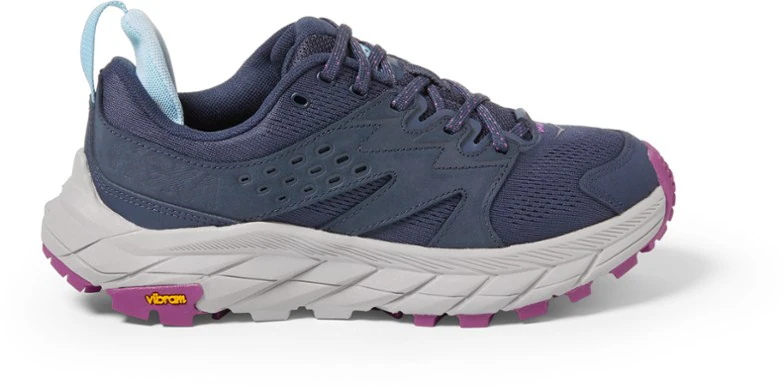
The best hiking shoes boast traction, durability, and comfort. Photo: Rebecca Sperry//The Inertia
Hiking is one of our favorite ways to get out and explore the natural world. Whether it’s close to home with friends, a multi-day thru-hike, or discovering a new trail on our travels, hiking is a great way to cover some ground and get your nature fix. While some may opt for sturdy hiking boots and others go for hiking sandals, hiking shoes are our go-to for the perfect compromise between support, protection, and comfort. We’ve been testing top options for well over a year, and we’ve put together a comprehensive list of the best women’s hiking shoes.
Navigate To: Buyer’s Guide | Comparison Table | How We Tested
Related: Best Hiking Shoes | Best Women’s Hiking Boots | Camping and Hiking Reviews
Editor’s Note: We updated this guide in April 2025 by removing old and out-of-stock shoes, naming some new top picks, and updating navigation and links.
The Best Women’s Hiking Shoes of 2025
Best Overall Women’s Hiking Shoe: Danner Trail 2650 Hiking Shoes
Runner-Up Best Women’s Hiking Shoe: La Sportiva Mutant
Best Value Women’s Hiking Shoe: Brooks Cascadia 18
Best Women’s Trail Running Shoe for Hiking: Hoka Speedgoat 6
Best Hybrid Women’s Hiking Shoe: Nike Pegasus Trail 5
Best Hiking Shoes for Travel: On Cloudultra 2
Best Overall Women’s Hiking Shoes
Danner Trail 2650 Hiking Shoes ($170)

Pros: No break-in required, breathable, stylish
Cons: Runs a little big
Upper: Suede leather/textile
Outsole: Vibram 460 rubber with Megagrip technology
Weight: 1 lb 2 oz
We’ve worn Danner hiking boots in the past and have always been impressed with the brand, so it came as no surprise that the Danner Trail 2650 Hiking Shoes are a winner. Unlike a lot of the hiking shoes we tested, the Trail 2650s were comfortable from the moment we slipped our feet into them.
The Trail 2650 utilizes a combination of leather and textile for the uppers, resulting in a lightweight yet breathable shoe with a cool aesthetic. They look good on the trail or with a pair of jeans to wear to your favorite brewery after a hike. At just over a pound, these shoes were a fairly average weight for a pair of hiking shoes, but they felt super light underfoot. The mesh lining ensures the shoes are breathable, which our tester greatly appreciated while hiking in hot and humid Hawaii.
Although the Trail 2650s claim they fit true to size, our tester felt they ran the tiniest bit big. She didn’t find it to be a problem as her feet swell when hiking, but if you’re between sizes or prefer a more snug fit, you may want to order a half-size down. The Trail 2650s have Vibram outsoles that proved to be plenty grippy on gravel, dirt, mud, and rock. The heels of the shoes are reinforced, which we appreciate for extra support and enhanced durability. Although the version we tested isn’t waterproof, the hiking shoe can be found in a Gore-Tex version as well. The Danner Trail 2650 took the win for the best overall hiking shoes due to in-step comfort, support over long hikes, breathability, and cool aesthetics.
CHECK PRICE ON REI Check Price on Backcountry
Runner-Up Best Women’s Hiking Shoes
La Sportiva Mutant ($165)
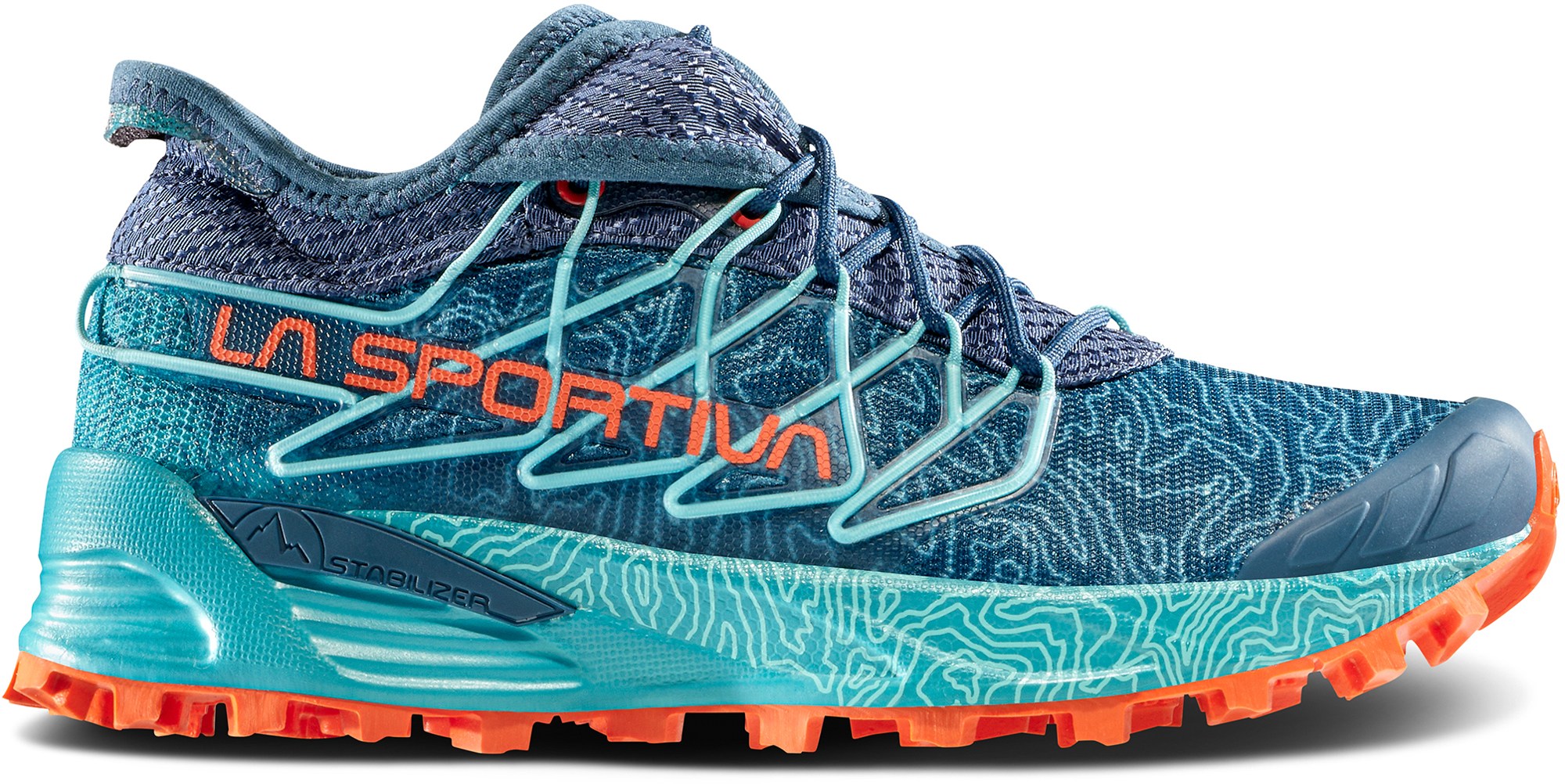
Pros: Incredibly grippy outsoles, easy to dial-in fit
Cons: Ankle support may be too prominent
Upper: Recycled nonslip AirMesh/TPU FusionGate reinforcements
Outsole: FriXion XF 2.0 compound
Weight: 1 lb 2.2 oz
While the La Sportiva Mutant is labeled as a trail running shoe, we found they worked even better for hiking. When we first slipped into these shoes, they didn’t feel like they were going to be a top performer. But after hitting the trail, we quickly changed our tune.
The quality of these shoes is evident. They feature an integrated lacing system that allows the laces to be lightweight and not cumbersome but still provide a secure hold. The ankle region sports a four-way stretch gaiter system that provides added ankle support and helps keep debris out. Our tester noted that the ankle support was amazing on hikes but felt a little weird while running — women who prefer a true low-top won’t love the feel.
While most hiking shoes offer reliable traction underfoot, the outsoles on the Mutants are what really set them apart from the crowd. The outsoles feature an ultra-sticky FriXion XF 2.0 rubber compound that works incredibly well on soft, muddy terrain or wet rock (a regular occurrence in Hawaii). They also have an Impact Brake System, which was so nice for navigating tricky downhill sections. They’re also compatible with spikes should you need them for winter hiking or extra slippery hikes. To top it off? These shoes look super cool. The Mutants finished just behind the Danner Trail 2650 because they weren’t quite as comfortable.
CHECK PRICE ON REI Check Price on Backcountry
Best Value Women’s Hiking Shoes
Brooks Cascadia 18 ($140)
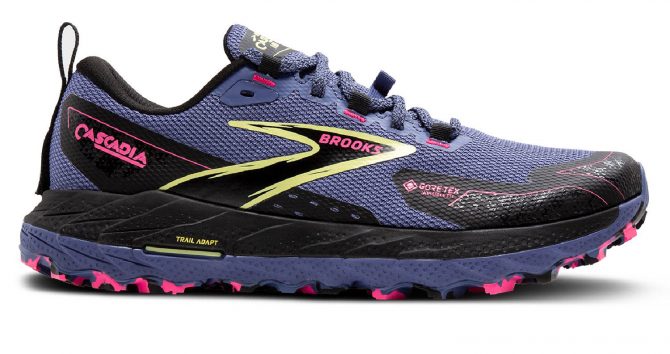
Pros: Lightweight, great traction
Cons: Runs small and the toe box is narrow
Upper: Single-layer mesh upper
Outsole: TrailTack Green rubber outsole
Weight: 1 lb 3.8 oz
The Brooks Cascadia, one of the early trail runners to hit the long-distance hiking scene, is continuing to evolve and improve upon its tried and true design with the 18th iteration dropping in 2024. These well-made, durable shoes are both rugged and lightweight, a perfect combination for long days on the trails. Plus, the complete feature set and awesome performance make this our favorite hiking shoe for the money.
We were excited to try out these new trail runners, but were a bit surprised to learn that our standard size was about a half-size too small. The fit seems to have changed a bit from the previous version, but everything else has improved. While the insoles were nothing to write home about, the traction, midsole comfort, and protection are awesome for such a lightweight hiking shoe.
In terms of the overall design, these shoes hit all the checkboxes, with great traction, mesh uppers that are breathable and dry fast, and added features like the flip-up velcro to attach gaiters. They are some of the most popular trail runners on the market for good reason and despite having a less-than-ideal experience testing them due to a sizing mismatch, we would be happy to try them out in a larger size with some custom insoles in the future, because they have the potential to be a great addition to her gear closet.
The Brooks Cascadia 18 is recommended for trail running, long-distance running, and hiking, but we don’t recommend them for pavement, as the outsoles are designed for stability and traction on rocky, slick surfaces. At $140, this shoe also represents great value.
CHECK PRICE ON REI CHECK PRICE ON AMAZON

Although it runs a touch small, the Brooks Cascadia 18 is an awesome hiking shoe for women. Photo: Rebecca Sperry//The Inertia
Best Women’s Trail Running Shoe for Hiking
Hoka Speedgoat 6 ($155)
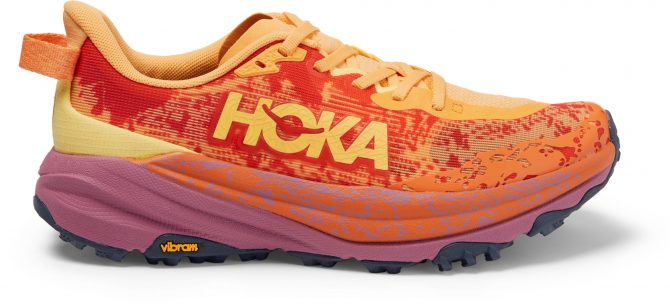
Pros: Excellent upper and Vibram sole for great traction
Cons: Sizing is a bit long
Upper: Woven Textile
Outsole: Vibram outsoles with 5mm lugs
Weight: 1 lb 2 oz
The Hoka Speedgoat 6 is one of the most popular trail runners on the market for good reason. With a super grippy Vibram sole, Waterproof upper, lightweight feel, and outstanding durability (much improved from the previous version), these shoes hit all of the boxes. We were excited to give them a try and were not disappointed. Conditions ranging from scree and loose dirt to muddy, rocky terrain were no match for these shoes.
There is no need for a break-in period with the Hoka Speedgoat 6, and in terms of trail conditions, whether you’re going off-trail or on pavement, these shoes can take whatever you throw at them. We would not necessarily recommend wearing these shoes solely on a treadmill or pavement because the traction is designed for more aggressive conditions; however, if you choose to wear these shoes only on pavement or indoors on the treadmill, they absolutely can handle it and take much longer than most trail runners to wear down. We’ve marked a noticeable improvement in durability over the Speedgoat 5.
While these shoes are perfect for the vast majority of hikers and trail runners, our tester found them to run a bit long (she needed to size down a half size), and the toebox felt a bit cumbersome on her narrow feet. In terms of arch support, we recommend adding insoles with added support if you suffer from foot problems as well.
CHECK PRICE ON REI CHECK PRICE ON Backcountry

Durable, lightweight, great traction—what’s not to love about the Hoka Speedgoat 6? Photo: Rebecca Sperry/The Inertia
Best Hybrid Women’s Hiking Shoes
Nike Pegasus Trail 5 ($150)
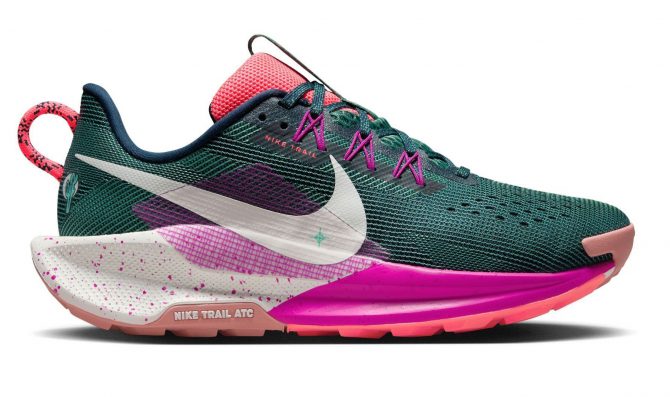
Pros: Lightweight, no break-in period
Cons: Less durable than most trail runners
Upper: Single-layer high-tuned mesh
Outsole: Nike Trail All Terrain Compound (ATC) rubber
Weight: 1 lb 1 oz
Breaking into the hiking scene, the Nike Pegasus Trail 5 trail runners are marketed for taking the wearer from the pavement to the trail. These super cushioned trail runners took us by surprise and although they may lack the durability and aggressive traction we’re used to, these shoes are superior in comfort and cushioning. The Pegasus 5 works great for a light hiker, especially those often hiking road-to-trail.
The Pegasus 5 is one of the most comfortable running shoes our tester has worn, even without added custom insoles. The ReactX midsole is well-cushioned and actually feels like walking or running on pillows. These shoes did not require any break-in period, and we did not experience any discomfort from wearing them. The non-GTX version is super breathable and the fit is superb.
The cons of these supposed road-to-trail shoes are durability and traction. While these are great running shoes for smoother surfaces with fewer rocks or roots, the overall durability of the Pegasus 5s is still lacking compared to heavier-duty shoes like the Danner Trail 2650. If you’re looking for traction on slippery or technical terrain these are not the shoes for you and you may want to consider a dedicated trail shoe, rather than a hybrid design like the Pegasus 5.
CHECK PRICE ON REI
While not as durable as some hiking shoes, the Nike Pegasus 5 Trail makes a perfect road-to-trail shoe. Photo: Rebecca Sperry//The Inertia
Best Women’s Hiking Shoes for Travel
On Cloudultra 2 ($180)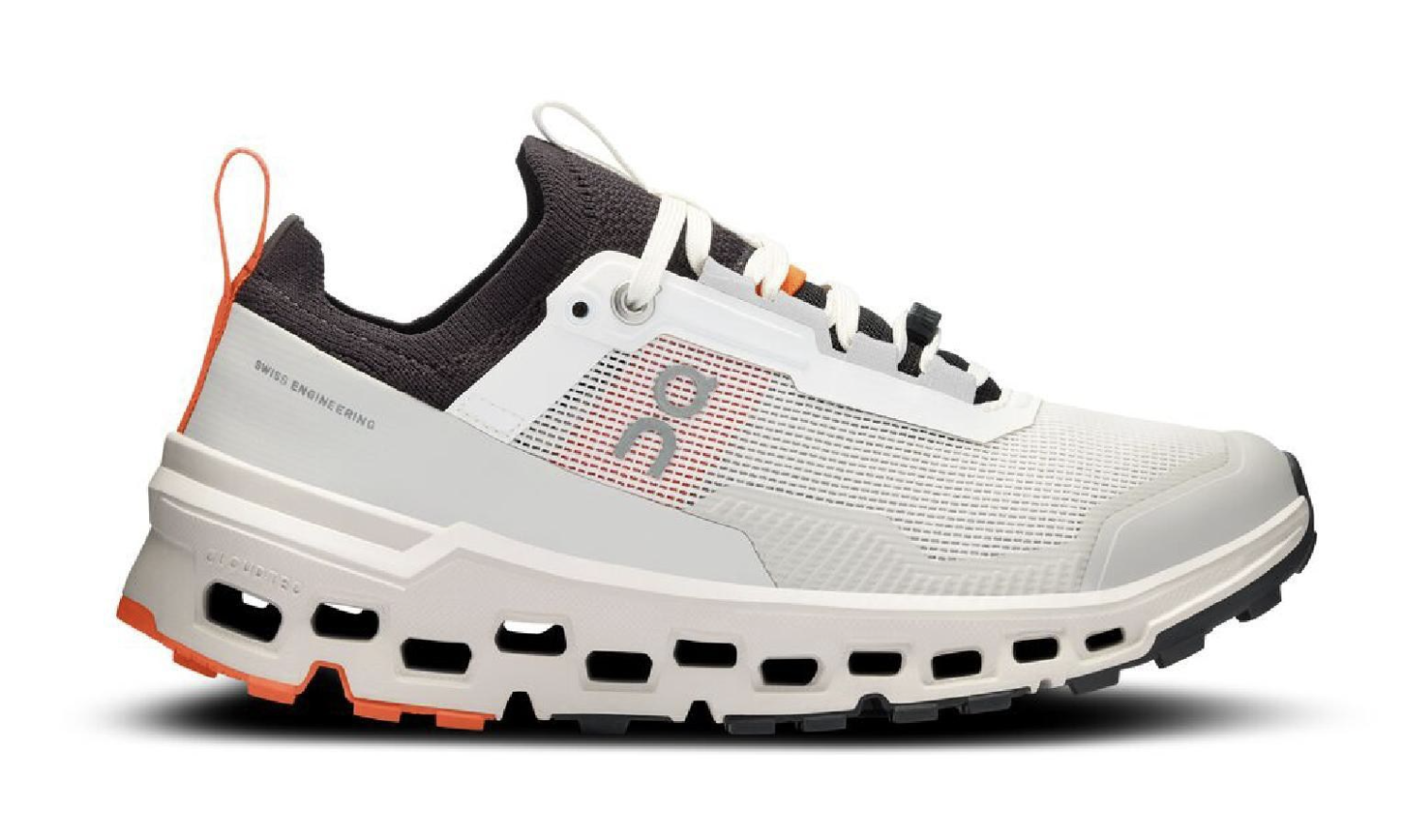
Pros: Versatile and comfortable
Cons: Rubbing from the sock liner
Upper: Recycled polyester double-layer mesh
Outsole: Missiongrip rubber
Weight: 1 lb. 2.7 oz.
The On Cloudultra 2 is a max-cushion trail offering from an increasingly popular brand, and we loved this shoe for both hiking and trail running. The good looks and excellent midsole/outsole combo combine for a tech-laden package that is easy to recommend for anyone from casual hikers to ultra runners. We love this shoe for traveling, as it performs as well on casual hikes and walks around town as it does 10 miles into the woods, so when you need to save space, you can just pack the Cloudultra 2.
The new sole platform is supposed to offer better trail conformance, and we were super pleased with the traction on both hard-packed trails and loose, muddy terrain in the Redwoods. While the shoe isn’t designed to be waterproof, the upper dries out super quickly, so if you need to cross a stream, no sweat. We did experience some rubbing from the sock-like upper, and the FlipRelease lace adjuster is cool, but we didn’t find ourselves using it on trail. That said, this trail running shoe is the total package, and we highly recommend the On Cloudultra 2—just make sure you try it before you buy it, as On sizing is unique in our experience.
Read our full review of the On Cloudultra 2 here.
Check Price on REI Check Price on Backcountry
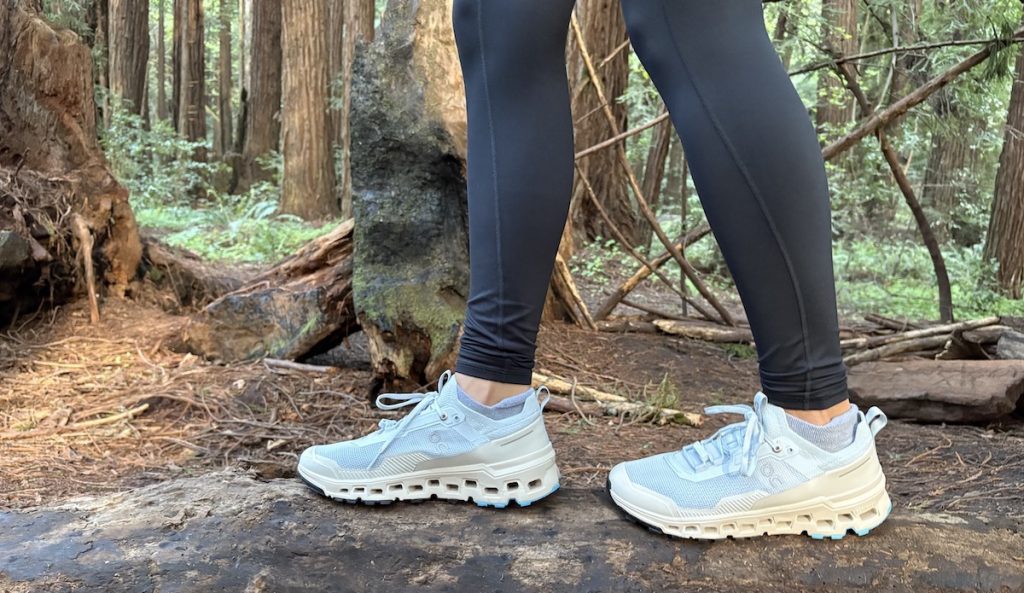
Photo: Rebecca Parsons//The Inertia
More Top Women’s Hiking Shoes
We’ve shuffled this list around plenty with more hike-testing; the following still represent awesome women’s hiking shoes. While they didn’t quite crack our top six, we still highly recommend the following options.
HOKA Anacapa Breeze Low ($155)
Pros: Super supportive and grippy
Cons: Tongue rubs against ankle
Upper: rPET engineered knit
Outsole: Vibram Megagrip rubber
Weight: 1 lb 4.4 oz
HOKA is another brand that makes exceptional trail runners and has been getting more and more into the hiking game. The Anacapa Breeze Low features recycled polyester material in the collars, mesh, and laces, and the polyurethane sock liners are derived from 50% soybean oil. Other features include Vibram Megagrip outsoles with 5-millimeter lugs, compression-molded EVA midsoles, molded sock-liners, anatomical Achilles construction, and HUBBLE heels for smoother impact.
These HOKA hiking shoes were comfortable, breathable, and super supportive, and while many reviews claimed that sizing was off, our tester felt that they fit true to size (though they do have generous shoe volume). The only issue she noticed was that the tongue felt like it was rubbing against her ankle and while it didn’t hurt or cause blisters it was noticeable. For those who want plush comfort in a maximalist hiking shoe, we highly recommend the HOKA Anacapa Breeze Low.
CHECK PRICE ON REI Check Price on Backcountry
Astral TR1 Mesh Shoes ($130)
Pros: Lightweight, antimicrobial properties
Cons: Minimal support
Upper: Ripstop mesh with thermoplastic polyurethane overlays
Outsole: G.15 high-friction non-marking rubber
Weight: 8.9 oz
Out of the box, we loved the looks of this hiking shoe. The low-profile design comes in neutral color tones — we’d be excited to wear these hiking shoes straight from the trail to a brewery. The Astral TR1 Mesh Shoes feature G.15 rubber for grip and abrasion resistance and Trail Grip outsoles for added traction. Astral is a brand centered around water activities, so it’s no surprise these shoes feature Astral’s Water Ready holes on the front/back to drain water and provide ventilation and treated insoles with antimicrobial properties to manage moisture and odors.
These shoes are incredibly lightweight and breathable and are perfect for adventures in and out of water. While they were comfortable and provided ample traction, these Astrals are barefoot-style hiking shoes, so they had minimal support. With that in mind, the shoe performs best on shorter hikes.
CHECK PRICE ON REI Check Price on Backcountry
Teva Ridgeview Low Hiking Shoes ($150)
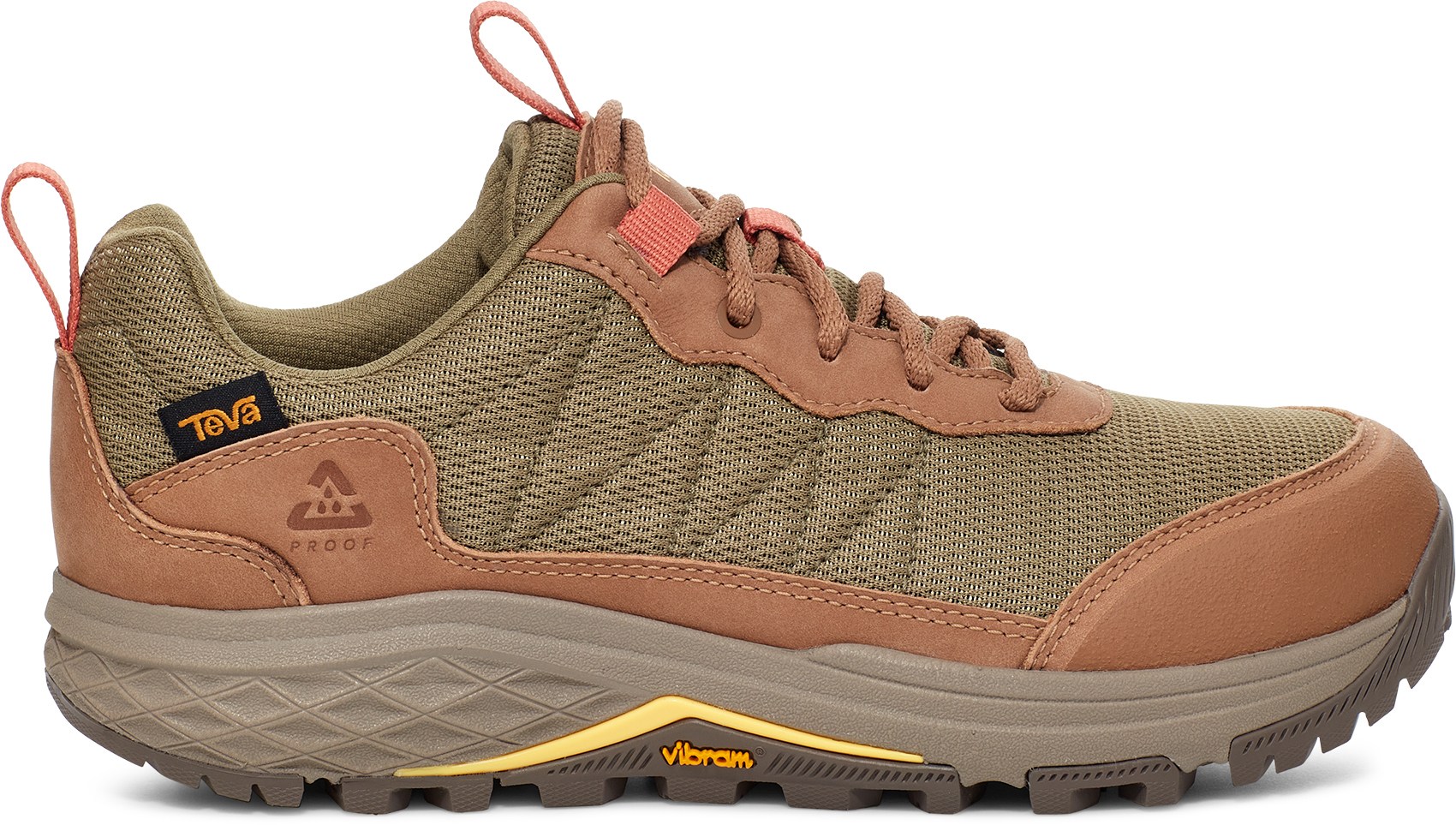
Pros: Moderate ankle support, made from recycled materials
Cons: Slight break-in period
Upper: Textile; leather
Outsole: Vibram Megagrip rubber
Weight: 1 lb 7.56 oz
Our tester has been a fan of Teva hiking sandals for as long as she can remember, so she was excited to put the Teva Ridgeview Low Hiking Shoes to the test. Luckily, they did not disappoint.
Designed for day hikes and backpacking, the Ridgeview shoes sport waterproof leather and waterproof membrane booties to ensure your feet stay dry. Our tester wore these on a local backpacking trip with her pup and despite getting caught in a rainstorm, her feet stayed nice and dry. Made from a recycled polyester mesh, the Ridgeview hiking shoes are comfortable and breathable.
Due to the leather construction, the Ridgeview does have a slight break-in period. Out of the box, they’re fine to wear on a medium-length hike, but we don’t recommend embarking on a longer trip without breaking them in first. Due to the higher cut, these shoes provide some ankle support and the footbeds feel cushy and supportive. Throughout our testing, we encountered wet, dry, smooth, and slippery surfaces and the Vibram outsoles performed like a champ.
Check Price on BackcountryOboz Katabatic Low Waterproof Hiking Shoes ($170)
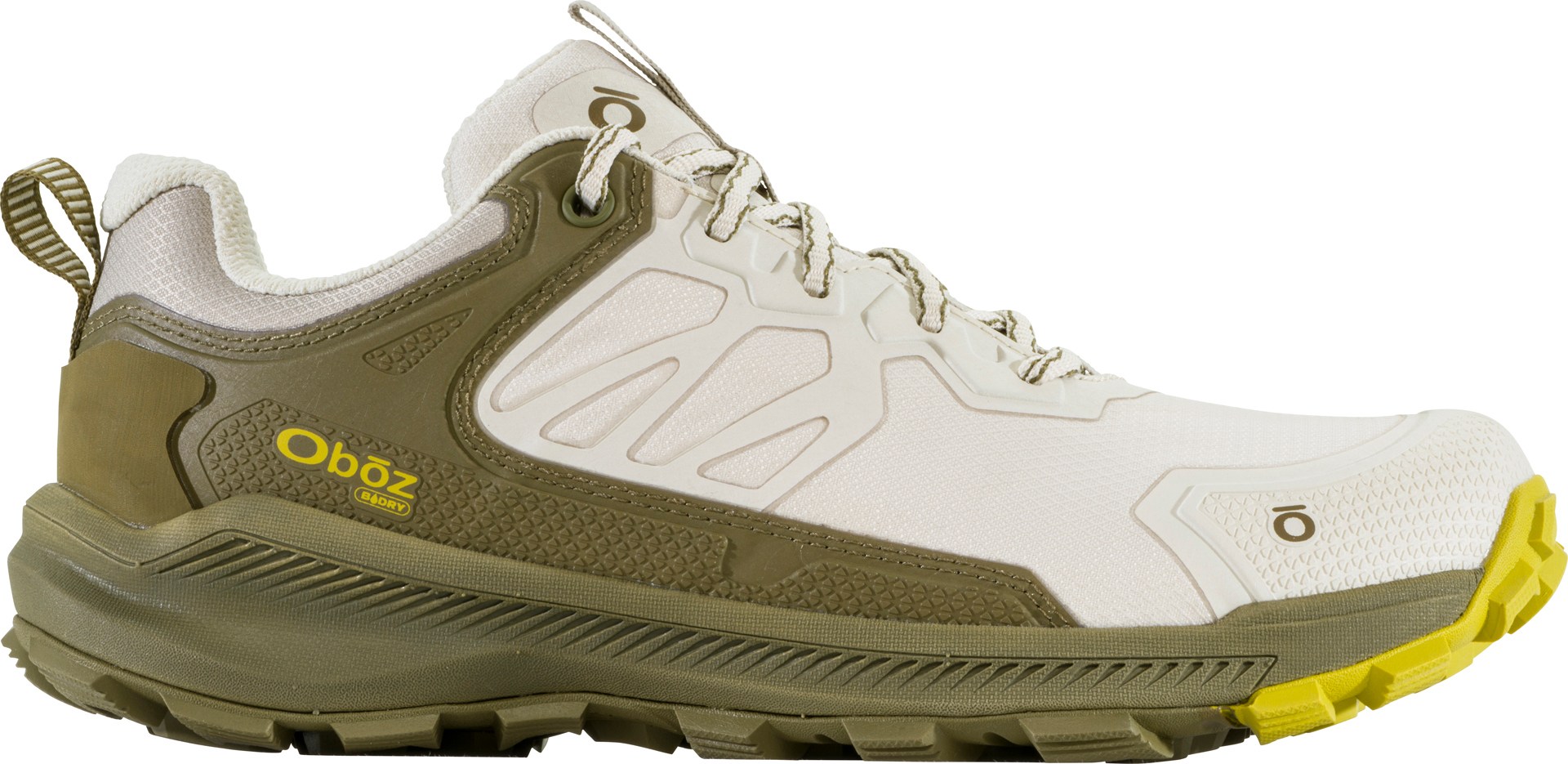
Pros: Incredible traction
Cons: Tongue rubs a bit
Upper: Mesh with reinforced TPU overlays
Outsole: Trail Tread rubber compound
Weight: 1 lb 7.2 oz
The Oboz Katabatic Low is designed with technical trails in mind. The Katabatics are waterproof yet breathable, making them perfect for long days on the trail.
The Katabatic felt comfortable from the get-go, but we did find that the tongue rubbed the tiniest bit. They felt supportive throughout the entirety of our hiking. The Oboz tread compound and lug pattern are insanely grippy. Our tester wore these shoes hiking on Oahu where the hikes are steep, muddy, and slippery, and the Katabatic felt incredibly reliable regardless of trail condition. Although they are a bit heavy, we highly recommend the Oboz Katabatic Low for both day hikes and multi-day adventures alike.
CHECK PRICE ON REI Check Price on Backcountry
HOKA Skyline-Float X ($175)

Pros: Incredibly comfortable, feels like they spring you off the ground
Cons: Underfoot support may be too much for some people
Upper: One-piece engineered knit upper
Outsole: Vibram XS Trek outsole
Weight: 14.9 oz
Although HOKA is best known for making running shoes, they deliver in the hiking shoes department as well. Case in point: the HOKA Skyline-Float X.
The HOKA Skyline-Float X is one of the most comfortable pairs of hiking shoes we have ever worn. They feel lightweight, spacious, and breathable, and with each step, it feels like your foot is springing off the ground. Advertised as a “hybrid” shoe, the Skyline-Float X works well for hiking on rugged trails as well as walking the dog around the block.
We are always a fan of HOKA materials and tech, and the Skyline-Float X features a soy-based sock-liner, 30% sugarcane midsole, 89% bio-based Pebax plate, and a Vibram XS Trek rubber outsole. The stack is tall, the cushioning is plush, and the tread is grippy underfoot. Step into this pair of shoes, and it feels soft, comfortable, and supportive. Plus, the Skyline-Float X has a trendy Gorpcore aesthetic that makes you want to lace up and set out.
Check Price on Backcountry CHECK PRICE ON HOKA
La Sportiva Ultra Raptor II Hiking Shoes ($149)
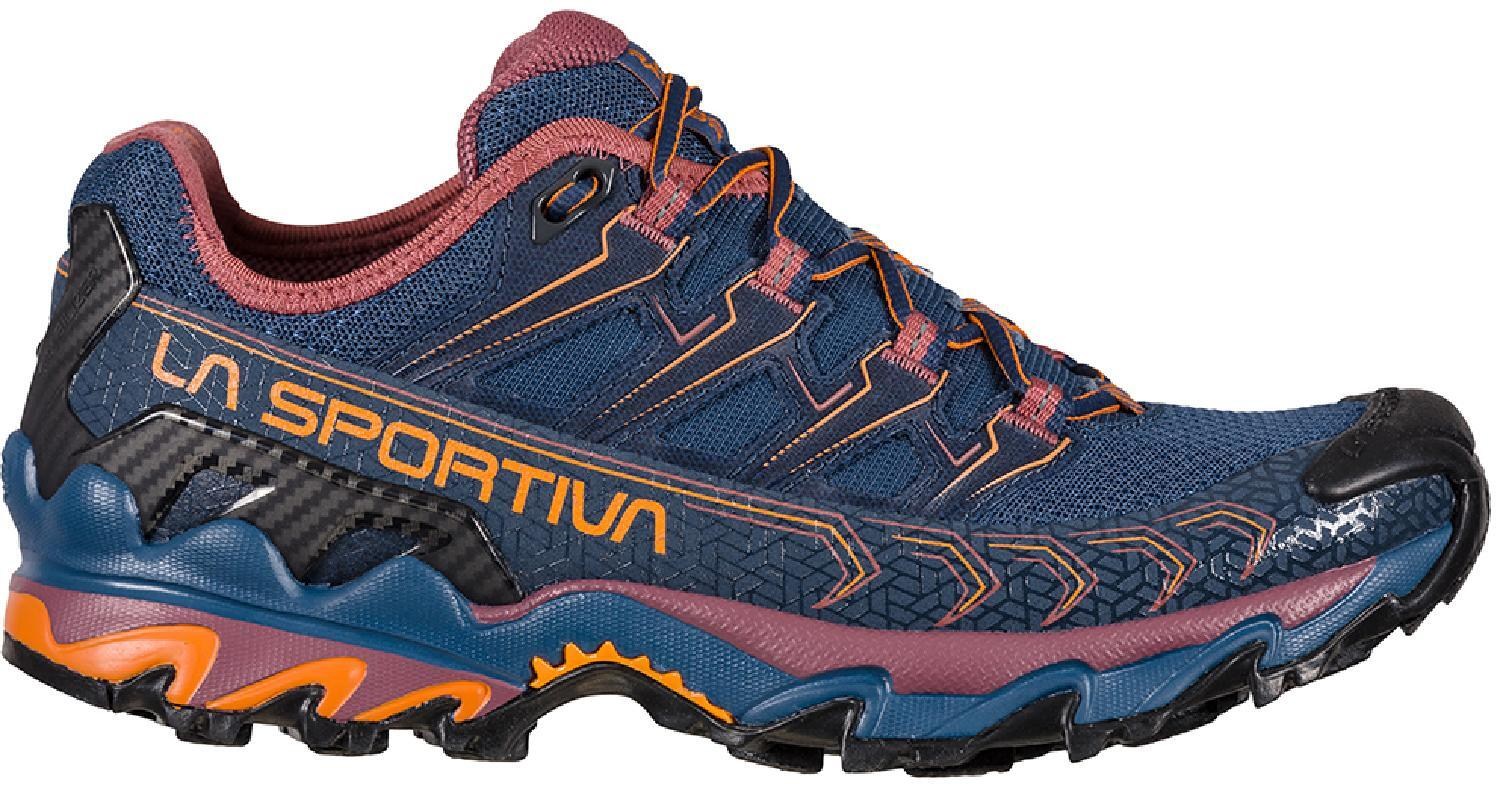
Pros: Insanely grippy, rock guards
Cons: Break-in period
Upper: AirMesh
Outsole: Frixion XF 2.0 X-Axis rubber
Weight: 1 lb 4.8 oz
The La Sportiva Ultra Raptor II Hiking Shoes are possibly the grippiest hiking shoes we have ever worn. These shoes sport aggressive 4.5 mm lugs, a sticky rubber outsole, an Impact Brake System, and Trail Bite heels.
Translation? The Ultra Raptors offer an incredibly reliable grip on both uphills and downhills, wet and dry surfaces, and everything in between. We’ve seriously never felt so confident on a technical trail than when wearing these bad boys.
The Ultra Raptors also provide a lot of support. They sit a little higher on the ankle than some other hiking shoes we tested, resulting in better ankle support. They also have a lacing harness, which helps provide a secure fit. The mesh uppers help keep your feet cool and the rock guards work to keep debris out. The only downside of the Ultra Raptors is that they do require a break-in period. Our tester wore them on a longer hike for her first go with them and had a pretty sizable blister on her heel to show for it. But like most shoes, they get more comfortable with time and their grip is unmatched.
Check Price on BackcountryTimberland GreenStride Motion 6 Low ($130)
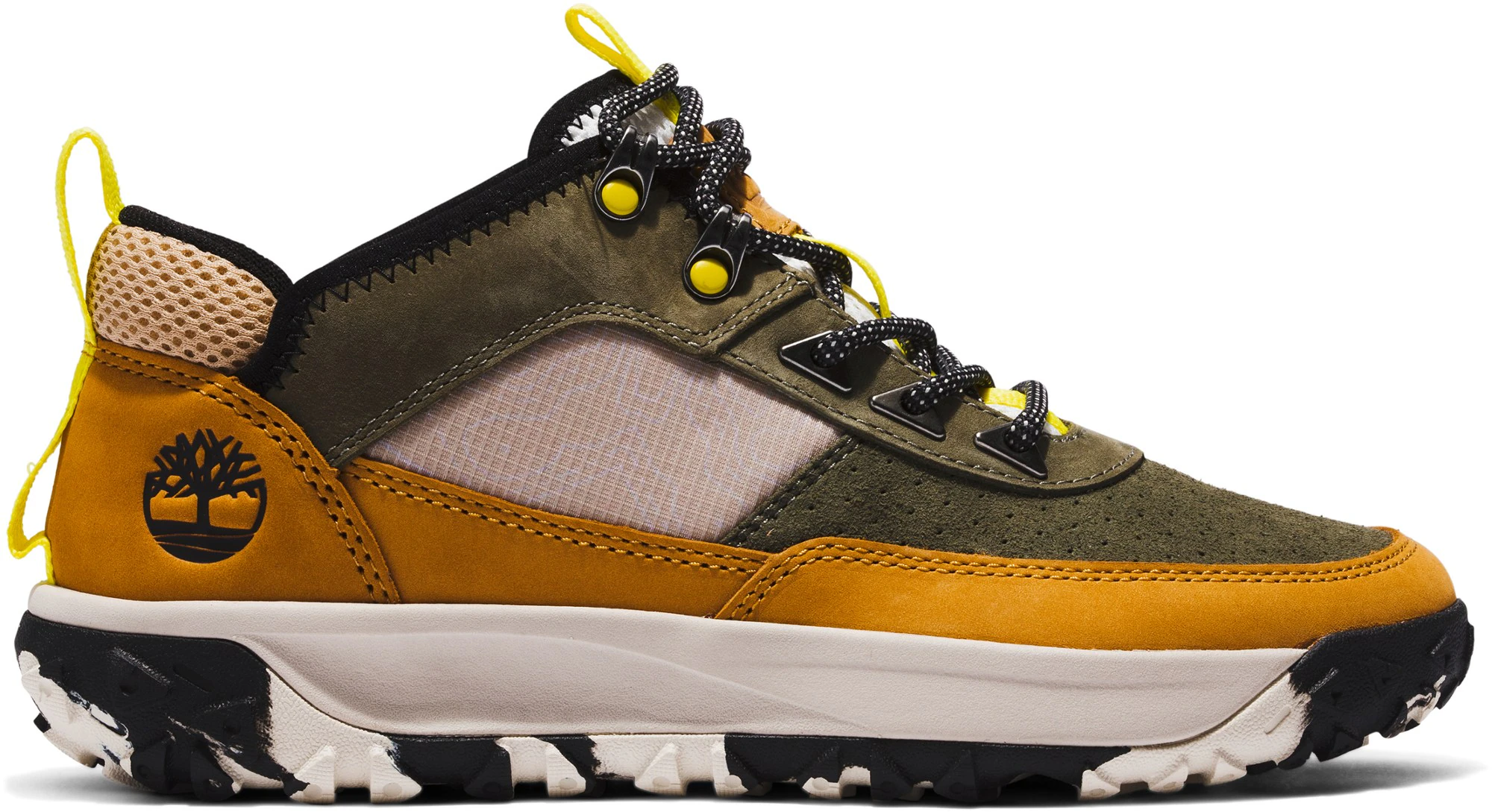
Pros: Unique aesthetic, made from recycled materials
Cons: Tongue rubs, heavy
Upper: Leather/fabric
Outsole: Rubber
Weight: 2 lbs 9.6 oz
Out of the box, we were really impressed with the aesthetic of the Timberland GreenStride Motion 6 Low. But Timberland has more of a reputation as a fashion outdoor brand than a technical hiking brand, so we were curious how the shoes would hold up on the trails.
At first, the Motion 6 Low isn’t the most comfortable pair of shoes. It feels like an insert is missing underfoot and the tongue rubs a bit if you’re not wearing higher socks. But once we hit the trail, we adjusted quickly and actually found them to be really comfy (although tall socks factored in).
Made with the environment in mind, the fabric lining contains at least 50% recycled plastic and bio-based midsoles contain a combination of 25% EVA, 75% sugarcane, and naturally grown rubber. The outsoles also contain 55% naturally grown rubber from farms committed to regenerative agriculture. The look and construction of the shoes are super cool, but we could see them being uncomfortable on a long trek. That said, for shorter efforts, they felt lightweight and breathable and provided good traction on a wide range of surfaces. The Motion 6 Low is a great town-to-trail hiking shoe.
CHECK PRICE ON REIXero Shoes TerraFlex II Hiking Shoes ($110)
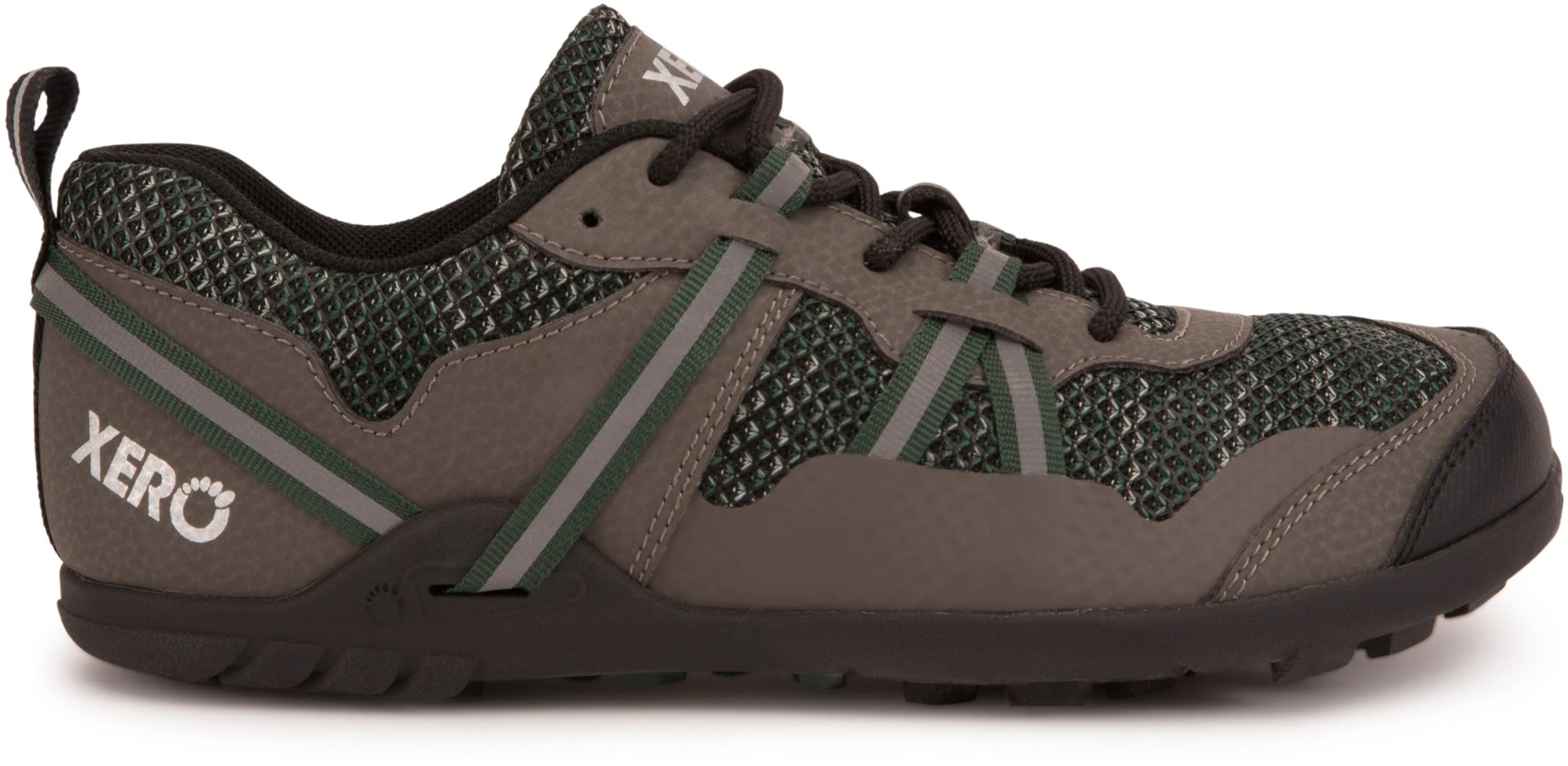
Pros: Heel cinch + adjustable mid-foot, super grippy outsole
Cons: Not supportive, require break-in period
Upper: Synthetic mesh
Outsole: FeelTrue rubber
Weight: 14 oz
Calling the Xero TeraFlex II a hiking shoe is a stretch. Out of the box, they look similar to a rock climbing shoe, with minimal (if any) midsole. After testing them out, we felt they best fall into the category of an approach shoe. Approach shoes are essentially a blend between a hiking shoe and a climbing shoe.
The TerraFlex II features a wide toe box and a “Xero-drop” design. While the design allows your toes to spread out and promotes a natural stride, you’ll definitely want to break these shoes in before taking them on a long hike. We’d suggest a few walks around the neighborhood before setting out on anything over a couple of miles otherwise you’ll end up sore.
Minimalist in all aspects, the TerraFlex II is lightweight and breathable with a wicking mesh liner that helps keep your feet cool and dry. If you’re even more of a glutton for ground-feel, the 3mm insoles are removable. The heel cinch and adjustable mid-foot are excellent design features to fully lock in the fit. Finally, the rubber outsoles are super grippy for hiking and climbing, and as a result, make great approach shoes.
CHECK PRICE ON REI Check Price on Amazon
Oboz Sawtooth X Low ($160)
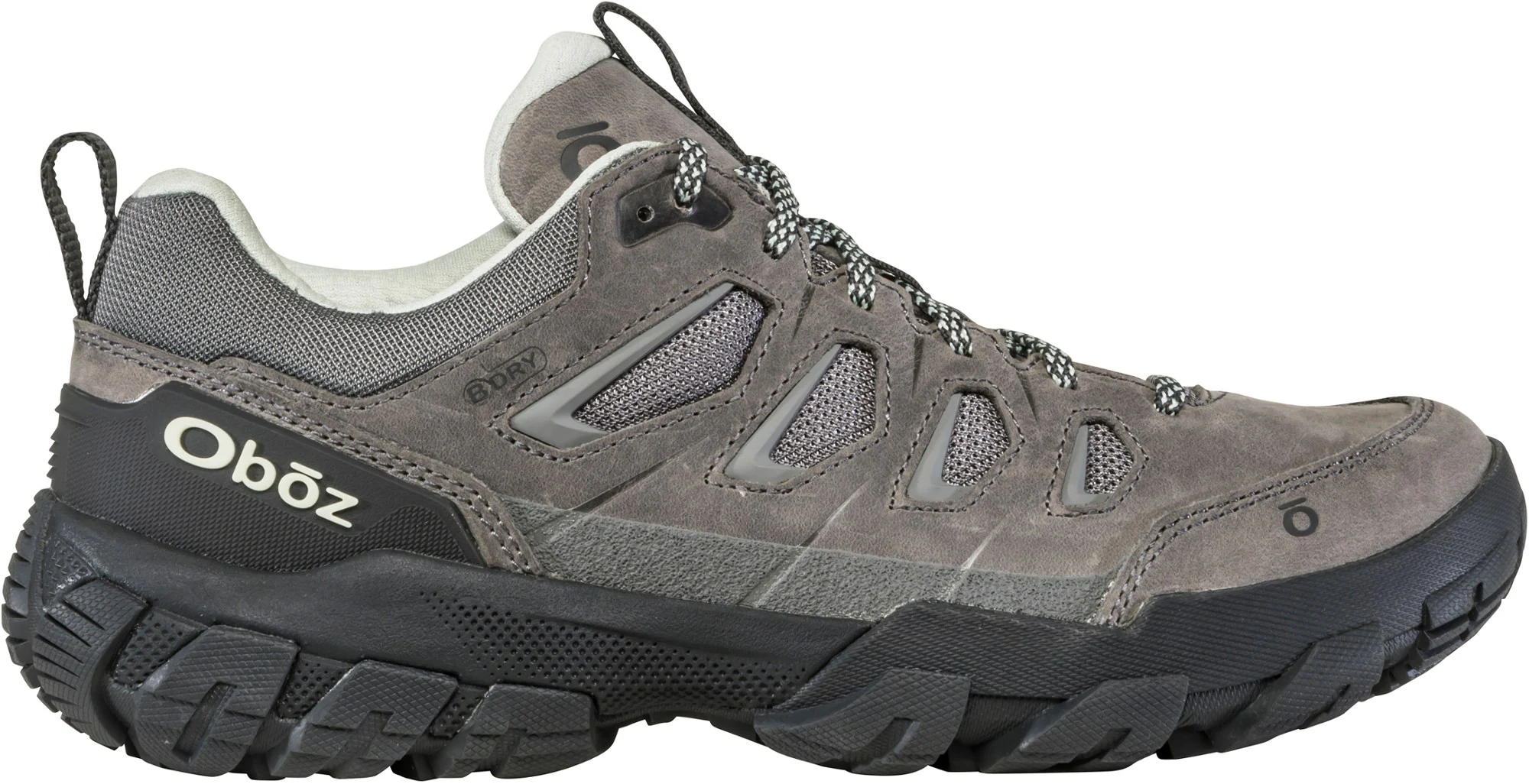
Pros: Incredibly durable, made from recycled materials
Cons: Not the most comfortable
Upper: Oiled nubuck leather/CORDURA fabric mesh
Outsole: True Tread rubber
Weight: 1 lb 12.2 oz
Oboz has been around for a long time, and the Oboz Sawtooth X Low was named for the 10th anniversary of the original Sawtooth hiking shoes. The Sawtooth is well made, durable, and provides incredible traction, but due to the stiff construction, it sacrifices a bit in the comfort department.
We definitely had to ease into wearing the Sawtooth X. For her first go, our tester wore this hiking shoe on a one-mile dog walk and found them to be rigid and clompy. The shoes certainly get better with time, but they’re never going to be the most flexible or nimble option out there.
What the Sawtooth lacks in comfort, it makes up for in other departments. Made from Oiled nubuck leather and CORDURA fabric mesh, the Sawtooth is a shoe that’s going to be in your closet for a long time. In addition to durable construction, these waterproof boots have incredibly sturdy rubber outsoles that provide the type of traction you’d expect in a solid hiking shoe. And if you’re wearing a lot of weight on your back, the added support and rigidity can help you balance that load. While we felt the Oboz Sawtooth X Low felt more like a hiking boot than a hiking shoe, we still recommend it for those looking for a stiff, low-top option.
CHECK PRICE ON REI Check Price on Backcountry
Women’s Hiking Shoes Comparison Table
| Hiking Shoes | Price | Upper | Outsole | Weight (Pair) | Waterproof? |
| Danner Trail 2650 Hiking Shoes | $170 | Suede leather/textile | Vibram 460 rubber, Megagrip technology | 1 lb 2 oz | Available |
| La Sportiva Mutant | $165 | Recycled nonslip AirMesh / TPU FusionGate reinforcements | FriXion XF 2.0 compound | 1 lb 2.2 oz | No |
| Brooks Cascadia 18 | $140 | Single-layer mesh upper | TrailTack Green rubber outsole | 1 lb 3.8 oz | Available |
| Hoka Speedgoat 6 | $155 | Woven textile | Vibram outsole with 5mm lugs | 1 lb 2 oz | Available |
| Nike Pegasus Trail 5 | $150 | Single-layer high-tuned mesh | Nike Trail All Terrain Compound (ATC) rubber | 1 lb 1 oz | No |
| On Cloudultra 2 | $180 | Recycled polyester double-layer mesh | Missiongrip Rubber | 1 lb 2.7 oz | No |
| HOKA Anacapa Breeze Low | $155 | rPET engineered knit | Vibram Megagrip rubber | 1 lb 4.4 oz | No |
| Astral TR1 Mesh Shoes | $130 | Ripstop mesh with thermoplastic polyurethane overlays | G.15 high-friction non-marking rubber | 8.9 oz | No |
| Teva Ridgeview Low Hiking Shoes | $120 | Textile; leather | Vibram Megagrip rubber | 1 lb 7.56 oz | Yes |
| Oboz Katabatic Low Waterproof Hiking Shoes | $170 | Mesh with reinforced TPU overlays | Trail Tread rubber compound | 1 lb 7.2 oz | Yes |
| HOKA Skyline-Float X | $175 | One-piece engineered knit upper | Vibram® XS Trek outsole | 14.9 oz | No |
| La Sportiva Ultra Raptor II Hiking Shoe | $149 | AirMesh | Frixion XF 2.0 X-Axis rubber | 1 lb 4.8 oz | No |
| Timberland GreenStride Motion 6 Low | $130 | Leather/fabric | Rubber | 2 lb 9.6 oz | No |
| Xero TeraFlex II | $110 | Synthetic mesh | FeelTrue rubber | 14 oz | No |
| Altra Olympus 5 Hike Low GTX | $200 | Leather | Vibram Megagrip rubber | 1 lb 10.5 oz | Yes |
| Oboz Sawtooth X Low | $160 | Oiled nubuck leather / CORDURA fabric mesh | True Tread rubber | 1 lb 12.2 oz | Yes |

The best hiking shoes in the game. Photo: Rebecca Parsons//The Inertia
How We Tested Women’s Hiking Shoes
Our female testing team lives across the United States, from Oahu to New England, and they spend tons of time hiking local trails. Rebecca Parsons and Rebecca Sperry took on the bulk of the testing. Parsons was in her college’s backpacking club and has done numerous overnight trips and countless day hikes since. She’s also an avid runner and prefers to do most of her miles on trails. To test out these hiking shoes, we took all options to our local trails and tested them out in as many conditions as we could — dry, wet, flat, hilly — to see how they performed.
This review originally ran in June of 2023. Since then, our testing team has logged additional mileage in our original picks as well as tested new options. We first updated this review in October of 2023 with additional picks and testing notes. We updated this review again in May 2024, by adding six new pairs of hiking shoes, and the Danner Trail 2650 narrowly edged out the La Sportiva Mutant as our best overall hiking shoe. We also removed some of our previous picks, including outdated versions of hiking shoes and out-of-stock hiking shoes. Our most recent update was in November 2024, with a few new picks and updated navigation. We will continue to add to this review as we test additional shoes and add any additional information that arises after spending more time on the trails.
-
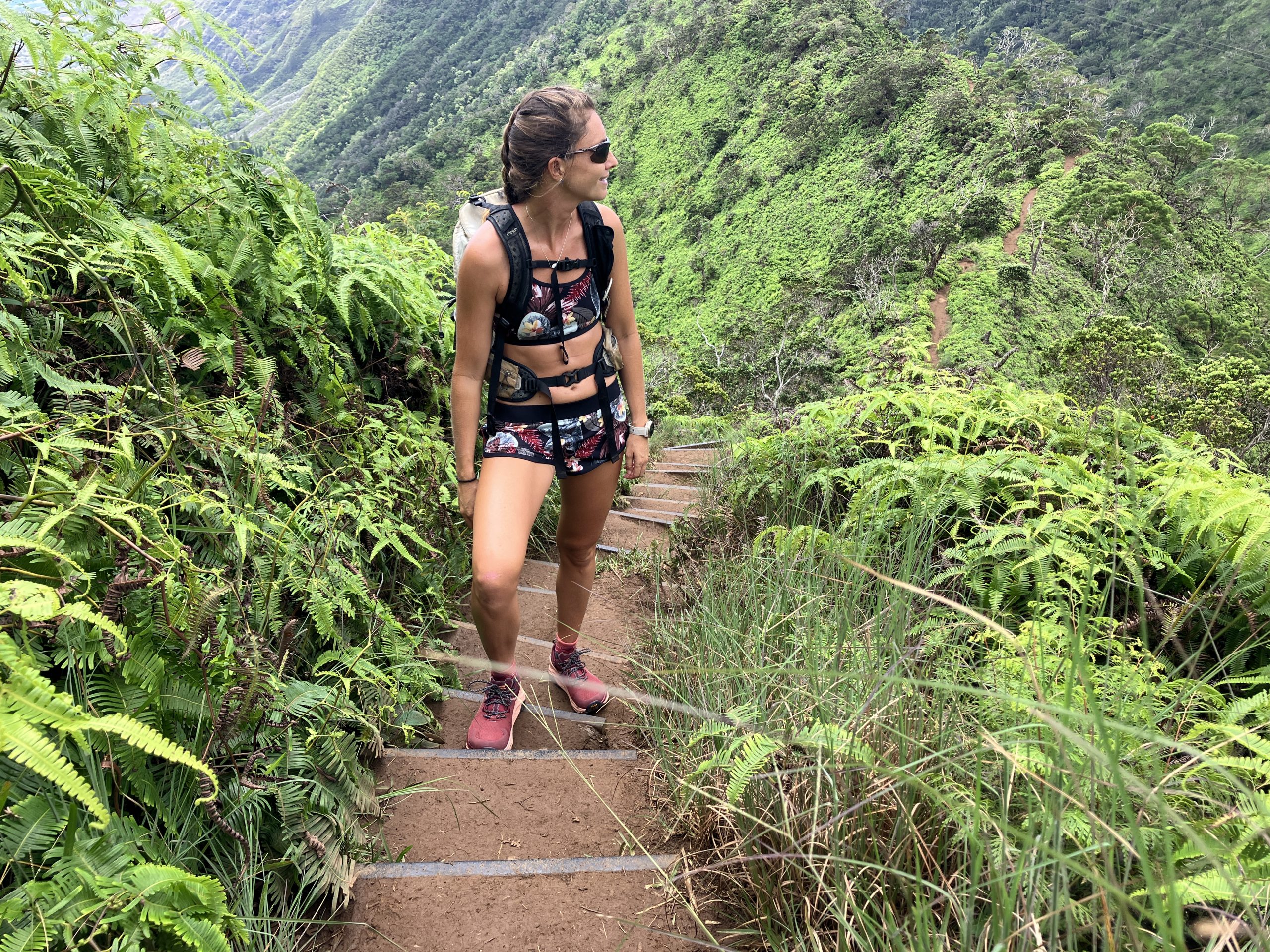
Hiking in the Altra Olympus 5 Hike Low GTX hiking shoes. Photo: Sarah Parsons//The Inertia
Women’s Hiking Shoes Buyer’s Guide
As the name suggests, hiking shoes are shoes designed specifically for hiking. They’re essentially a slimmed-down version of a hiking boot, often in a low-top. Hiking shoes tend to be lighter and generally more flexible than hiking boots. They still offer a good amount of support, but don’t have the same ankle support that hiking boots do for carrying heavier loads.
Types of Hiking Shoes
True Hiking Shoes
True hiking shoes are built specifically for hiking and offer a combination of support and traction. They’re durable and often are waterproof. Hiking shoes aren’t ideal for running in, but make a great shoe for the hiker who plans to log long miles and wants extra support, but not as much support as a hiking boot.

The Danner Trail 2650 Hiking Shoes are stylish, rugged, and comfy. Photo: Rebecca Parsons//The Inertia
Trail Running Shoes
Trail runners are running shoes with added traction for navigating trails, but they double as great hiking shoes. They tend to be lighter and have less support than a true hiking shoe, but they are often more comfortable and maneuverable. They typically don’t last as long as hiking shoes either. If you like to trail run and hike, or prefer lighter, more nimble shoes, these are a great choice.

The Altra Lone Peak 8 is an excellent lightweight trail running shoe for hiking. Photo: Rebecca Parsons//The Inertia
What Should I Look For in Women’s Hiking Shoes?
Traction
When it comes to hiking shoes, traction is super important as most of the time in the shoes will be spent off-roading. We want shoes that we can rely on in both wet and dry conditions on a variety of terrains, so we can focus on our surroundings instead of my footing.

Reliable traction underfoot is essential. Photo: Rebecca Parsons//The Inertia
Lug Pattern
The lug pattern plays a big role in the overall traction of your hiking shoes. The lugs are the traction-giving bumps on the outsoles of the shoes. Generally speaking, deeper and thicker lugs will provide better grip. Lugs that are spread further apart also provide generous traction and help shed mud.

Brooks’ proprietary outsole is one of our favorites for traction on a variety of surfaces. Photo: Rebecca Sperry//The Inertia
Weight
Often, the reason you’ll be opting for women’s hiking shoes over hiking boots is because you want to shed some valuable ounces. Our favorite hiking shoes were lightweight without sacrificing support.
Fit
You don’t want your feet sliding around while you’re hiking or rubbing up against the sides causing blisters, so fit is important. You want a hiking shoe that fits fairly snug, but still gives your toes some wiggle room, as swelling feet while hiking is normal.

The Danner Trail 2650 hiking shoes took the win for the best overall hiking shoes thanks to their comfort, breathability, and cool aesthetic. These lightweight hiking shoes perform as great as they look.
Support
If you plan to spend a lot of time on the trail, you’ll want some support underfoot. Too little cushion can get uncomfortable, but too much can feel unstable. We sought out hiking shoes that balanced support with maneuverability.

Durable, grippy shoes are a win on the trails. Photo: Kip Tousuell//The Inertia
Durability
It’s no secret that hiking shoes cost a pretty penny. As such, we want a shoe that will last. You’ll likely be spending a lot of your time outdoors in the elements, so you’ll want your hiking shoes to be able to withstand water, mud, rocks, and anything else the trail may throw your way.

Exploring Hawaii’s trails in the HOKA Anacapa Breeze Low. Photo: Madeline Price//The Inertia
Waterproofing
Some hiking shoes are waterproof, others are not. If you plan on hiking in wet and muddy terrain, waterproof shoes like those with Gore-Tex are great. That said, waterproofing typically reduces a hiking shoe’s breathability, so if you primarily hike in hot, dry climates it’s best to opt for non-waterproof shoes.

Whenever possible, we recommend trying on hiking shoes before buying them. Photo: Rebecca Sperry//The Inertia
Comfort
Trust us, you want to make sure your hiking shoes are comfortable. Due to the various conditions and uneven terrain that hiking brings, you want to ensure your hikers feel good underfoot and won’t cause rubbing or blisters. If possible, try them on and walk around in the store before purchasing. Or, if you order online, make sure they have a solid return policy in case they’re not everything you hoped they would be.
Return to Comparison Table | Return to Top Picks
Editor’s Note: For more camping and hiking gear reviews, click here. Or, check out the gear categories we cover. For our most recent gear coverage, click here.


